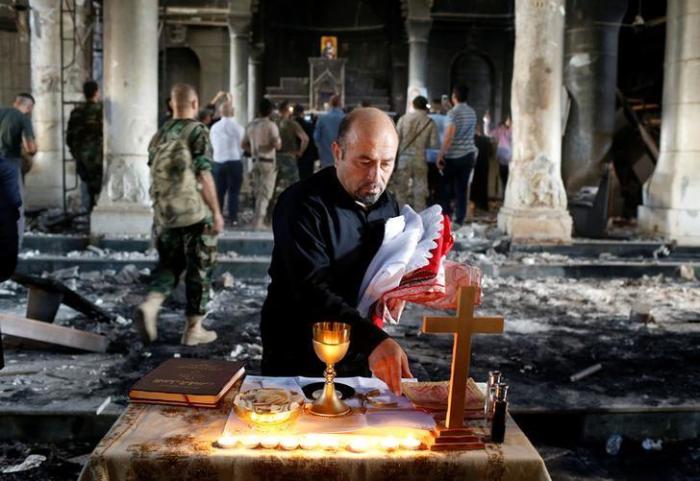'ISIS Might Have Lost the Battle but Won the War' If Christians Can't Safely Live in Iraq, Charity Warns

Catholic charity Aid to the Church in Need has warned that unless world leaders start taking action, the recent defeats suffered by the Islamic State terror group in Iraq and Syria might not be enough to save the Christian population in the region from being eradicated.
"We have seen drastic reductions in the Christian populations in many nations in the Middle East. Iraq might very well have lost 80 percent of their native Christian people," Edward Clancy, ACNUSA director of outreach, told The Christian Post in an email interview on Wednesday. "Syria might have lost 50 percent. This is compounded by the fact that Christian families have not been secure enough to have many children. The loss of population and the very low birth rate will put great pressure on the Christian communities."
He warned that Christians will be "hard pressed to survive when they are 2 percent or 1 percent and become an aging population."
"If we do not help these ancient Christian communities, ISIS might very well have lost the battles but won the war."
Under a new U.S. strategy, IS has suffered heavy losses recently and has been driven out of a number of key cities it once held, most recently in Raqqa in Syria, which was the terror group's de facto capital.
As ACN's "Persecuted and Forgotten? 2015–17" report released last week noted, the persecution of Christians has grown and reached its highest ever levels in the past couple of years, with the eradication of Christians in the Middle East highlighted as a major concern.
The report said that hope has risen with stories of Christian families returning to their homes in the Nineveh Plains as IS continues to be driven out of Iraq, but the future of the faithful in the region remains very much uncertain.
Clancy told CP: "Our solace is knowing that whenever Christians have faced terrible odds, great miracles have happened. Christianity has survived and endured, but we needn't wait for miracles. We can act. We can help. We should do both."
Some church leaders in the Middle East expressed in the report that they feel forgotten by the international community. ACNUSA's director of outreach argued that many in the West do take the Church and Christian communities for granted.
"Even when Christians are in the minority, they consistently show themselves to be a positive force in those communities. For example, throughout the Middle East and around the world, Christians provide opportunities for better education for Christians and non-Christians alike. This is because it is part of the witness of the Gospel," Clancy continued.
"Western leaders need to understand that these Christian communities are key for peaceful coexistence among Yazidi, Sunni, Shia and Kurds in Iraq and will be likewise in Syria among the different ethnic and religious groups."
He urged Western governments and world leaders to offer more help to families trying to resettle back in their homelands.
"They need our help. It is more than just guaranteeing property rights for returning families. The security of their communities is a major issue. It is about leaders not being afraid to say that these Christians belong in their ancestral towns and that they deserve to be supported and protected," he said.
"Aid to the Church in Need is committed to insisting on that vital message. We will continue to be a voice for the voiceless."
Clancy said he's also concerned that rising tensions between the U.S. and North Korea could lead to Christians suffering harsher punishments in that country.
Christians in North Korea are already some of the most persecuted people in the world, the ACN report noted, and Clancy said that fears for their well-being are growing as the U.N. increases sanctions against Kim Jong Un.
"The stories of abuse, imprisonment, and denial of freedoms for Christians are constant. The regime is one of the harshest in human history," he noted.
"While it is hard to believe it might get any worse, it could very well happen that Christians will be targeted even more severely because of their perceived allegiance to Western thinking."
Christians have also suffered an increase in violent attacks and persecution from the governments of China, India and Pakistan, with believers sometimes seen as traitors and agents of the West for their decision to embrace Christianity.
Clancy offered Arunachal Pradesh State in India as an example of how positive change can happen, however.
"In 1978, laws were passed to prevent missionaries from converting the native people. Then, Christianity was a very small minority," he recalled.
"Now some 40 years later, Christians are the largest faith group in the state. In spite of efforts to control and even prevent conversions, people have converted because some of the native people were witness to the faith and once they converted of their own free will, they became an example to others."
The ACN report says that it serves as a "call to action" for the world. Clancy explained that the first step is recognizing just how severely and how many Christians are being persecuted.
"Though, just as when there was the initial declaration of genocide by ISIS against Christians, there needs to be more than just words. World leaders should put political pressure on governments who regularly mistreat Christians or turn a blind eye to violence perpetrated against Christians," he urged.
"If need be, political and economic sanctions should be considered and used."
Clancy said that believers can do four important things:
"Pray for our Christian brothers and sisters in these hostile places; stay informed; inform others; and help support the persecuted church by their voices and their donations."




























